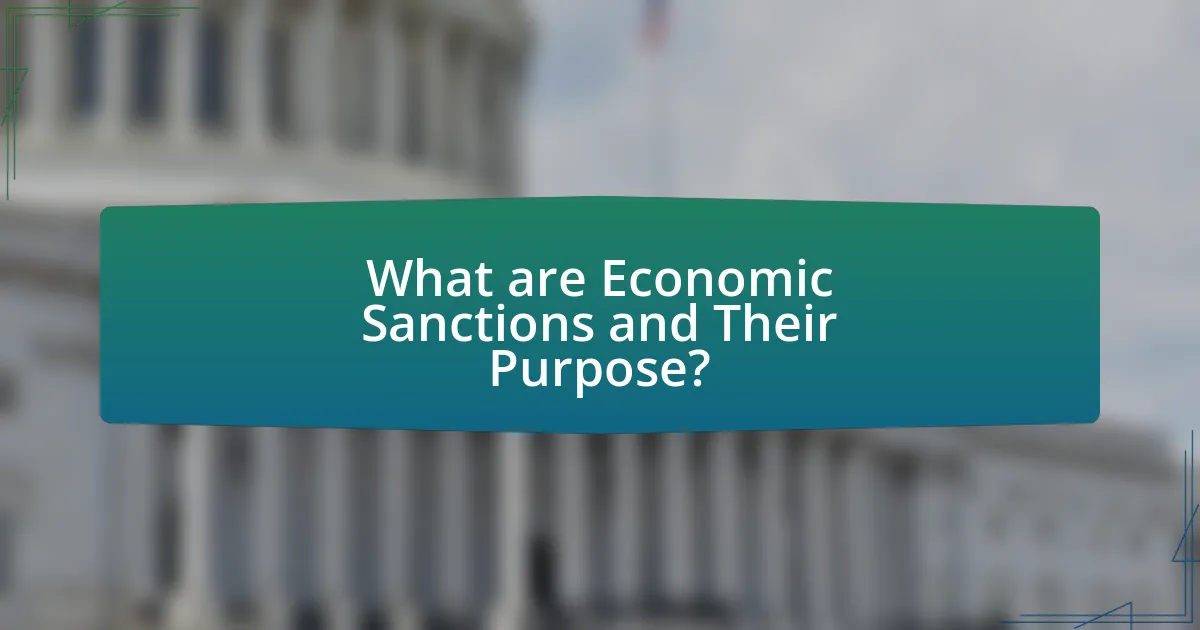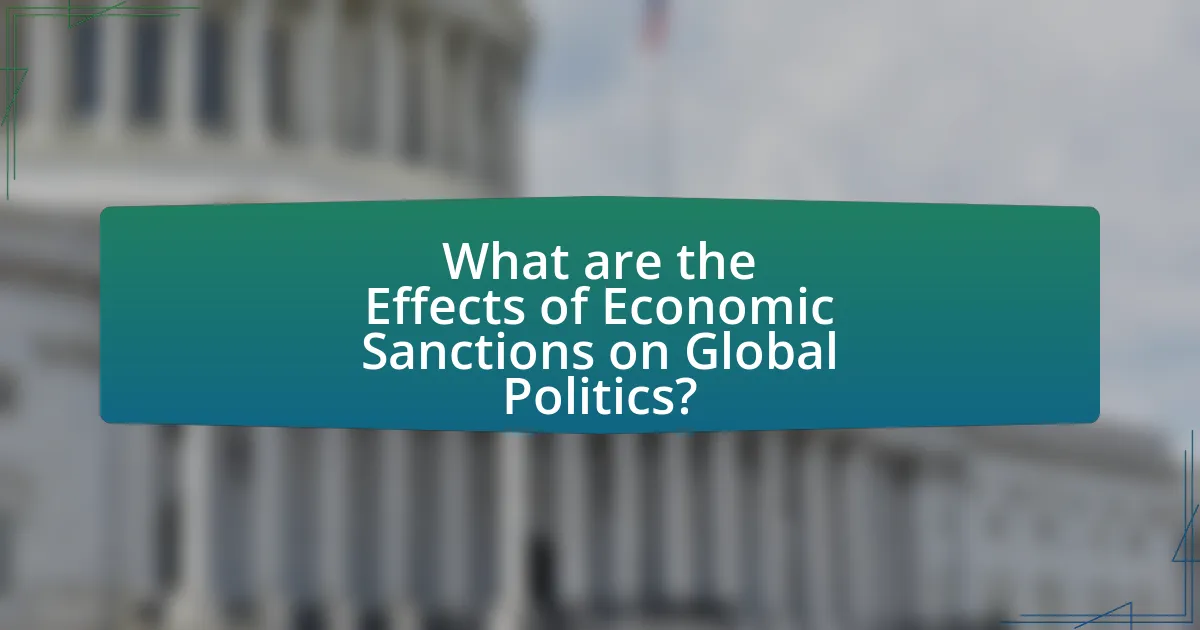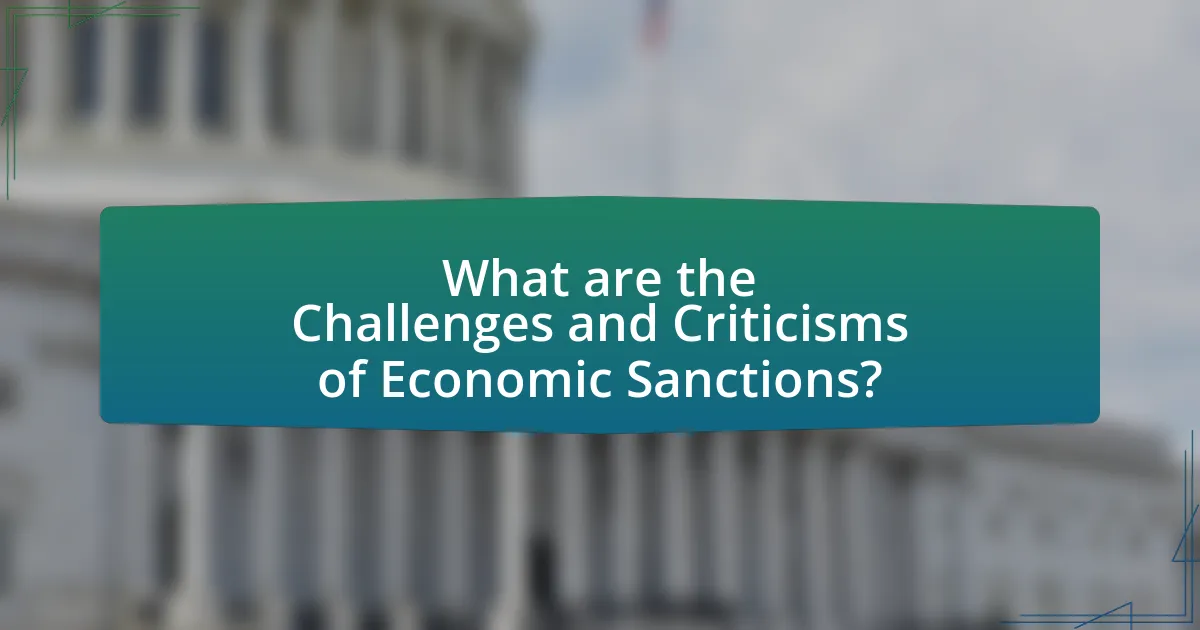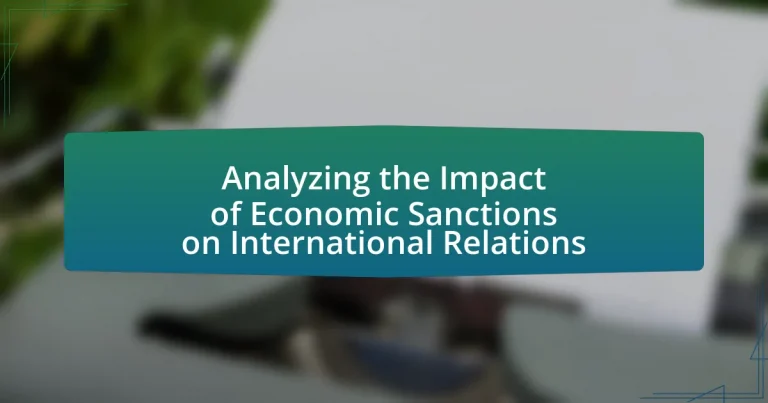Economic sanctions are restrictive measures imposed by countries or international organizations to influence the behavior of target nations or entities, primarily aimed at enforcing compliance with international laws and norms. This article analyzes the various types of economic sanctions, their functions in international relations, and the political objectives they seek to achieve. It explores the consequences of sanctions on targeted nations, including economic decline and social unrest, as well as their impact on global politics and diplomatic negotiations. Additionally, the article addresses the challenges and criticisms surrounding economic sanctions, including their effectiveness and humanitarian implications, while suggesting best practices for their implementation and the importance of international collaboration.

What are Economic Sanctions and Their Purpose?
Economic sanctions are restrictive measures imposed by countries or international organizations to influence the behavior of a target nation or entity. Their primary purpose is to compel compliance with international laws or norms, deter undesirable actions, or punish violations, such as human rights abuses or aggression. For instance, the United Nations has implemented sanctions against North Korea to curb its nuclear weapons program, demonstrating how sanctions can serve as a tool for international diplomacy and security.
How do Economic Sanctions function in International Relations?
Economic sanctions function in international relations as tools employed by countries or international organizations to influence the behavior of a target state by restricting its economic activities. These sanctions can take various forms, including trade restrictions, asset freezes, and financial barriers, aimed at compelling the target to change specific policies or actions, such as human rights violations or military aggression. For instance, the United States imposed economic sanctions on Iran to deter its nuclear program, which significantly impacted Iran’s economy, leading to a reduction in oil exports and inflation rates. The effectiveness of these sanctions often depends on the level of international support and the target state’s economic resilience.
What types of Economic Sanctions are commonly used?
Economic sanctions commonly used include trade sanctions, financial sanctions, and targeted sanctions. Trade sanctions restrict the exchange of goods and services with a specific country, often aimed at limiting its economic capabilities. Financial sanctions involve prohibiting access to financial markets or freezing assets, which can significantly impact a nation’s economy. Targeted sanctions, also known as smart sanctions, focus on specific individuals or entities, such as government officials or companies, to minimize broader economic harm while still exerting pressure. These types of sanctions have been employed in various international contexts, such as the United States imposing trade and financial sanctions on Iran to curb its nuclear program, demonstrating their effectiveness in influencing state behavior.
How do Economic Sanctions differ from other forms of diplomatic pressure?
Economic sanctions differ from other forms of diplomatic pressure primarily in their coercive economic impact, targeting a nation’s economy to achieve political objectives. Unlike diplomatic negotiations or verbal condemnations, which rely on dialogue and persuasion, economic sanctions impose restrictions such as trade barriers, asset freezes, or financial penalties. For instance, the United States imposed economic sanctions on Iran to deter its nuclear program, significantly affecting Iran’s economy and international trade relations. This method of pressure is distinct because it directly influences a country’s economic stability, often leading to humanitarian consequences, unlike softer diplomatic measures that may not have immediate economic repercussions.
Why are Economic Sanctions imposed by countries?
Economic sanctions are imposed by countries primarily to influence the behavior of other nations or entities, often in response to actions deemed unacceptable, such as human rights violations, aggression, or nuclear proliferation. For instance, the United States has imposed sanctions on North Korea to deter its nuclear weapons program, aiming to compel compliance with international norms. These sanctions can restrict trade, financial transactions, and access to resources, thereby exerting economic pressure to achieve diplomatic objectives. The effectiveness of sanctions is often evaluated based on their ability to alter the targeted country’s policies or actions, as seen in cases like Iran, where sanctions were aimed at curbing its nuclear ambitions.
What political objectives do Economic Sanctions aim to achieve?
Economic sanctions aim to achieve political objectives such as altering a target country’s behavior, enforcing international norms, and compelling compliance with international laws. These sanctions are often employed to pressure governments to change policies, such as ceasing human rights violations or halting military aggression. For instance, the United Nations imposed sanctions on Iraq in the 1990s to compel compliance with resolutions regarding disarmament. Additionally, sanctions can serve as a tool for signaling disapproval of a regime’s actions, thereby influencing both domestic and international perceptions.
How do Economic Sanctions reflect a country’s foreign policy?
Economic sanctions reflect a country’s foreign policy by serving as a tool to exert pressure on other nations to change their behavior or policies. For instance, the United States imposed economic sanctions on Iran to deter its nuclear program, demonstrating a strategic approach to influence international security dynamics. These sanctions often signal disapproval of actions such as human rights violations or aggression, aligning economic measures with diplomatic objectives. The effectiveness of sanctions can be assessed through their impact on the targeted country’s economy and political landscape, as seen in the case of North Korea, where sanctions aimed at curbing nuclear weapons development have significantly affected its economy.
What are the potential consequences of Economic Sanctions?
Economic sanctions can lead to significant economic decline, political isolation, and humanitarian crises in the targeted country. For instance, sanctions imposed on Iraq in the 1990s resulted in a 50% decline in GDP and widespread shortages of food and medicine, severely impacting civilian life. Additionally, sanctions can strain diplomatic relations, as seen in the case of North Korea, where prolonged sanctions have led to increased tensions and military provocations. These consequences illustrate how economic sanctions can destabilize economies and exacerbate social issues, ultimately affecting international relations.
How do Economic Sanctions impact the targeted nation’s economy?
Economic sanctions significantly harm the targeted nation’s economy by restricting trade, investment, and access to financial markets. These restrictions lead to reduced economic growth, increased unemployment, and inflation. For instance, the sanctions imposed on Iran in 2012 resulted in a 6.6% contraction of its economy in 2013, as reported by the International Monetary Fund. Additionally, the sanctions limit the nation’s ability to import essential goods, leading to shortages and increased prices for consumers. The cumulative effect of these sanctions can destabilize the economy, provoke social unrest, and diminish the government’s capacity to provide public services.
What are the social implications of Economic Sanctions on the civilian population?
Economic sanctions significantly disrupt the social fabric of civilian populations by exacerbating poverty, limiting access to essential goods, and increasing social unrest. These sanctions often lead to a decline in economic activity, resulting in job losses and reduced income for families. For instance, the United Nations reported that sanctions imposed on Iraq in the 1990s led to a humanitarian crisis, with a substantial increase in child mortality rates due to lack of access to food and medical supplies. Furthermore, sanctions can foster resentment towards the imposing countries, leading to increased nationalism and social division within the affected population. This social fragmentation can manifest in protests, civil disobedience, and, in extreme cases, violent conflict, as seen in countries like Venezuela, where sanctions have contributed to widespread social unrest and migration crises.
How do Economic Sanctions affect international relations?
Economic sanctions significantly impact international relations by altering diplomatic dynamics and economic interactions between countries. These sanctions can lead to strained relationships, as targeted nations often perceive them as acts of aggression or hostility, which can result in retaliatory measures or increased isolation. For instance, the United States’ sanctions against Iran have not only affected Iran’s economy but have also complicated U.S.-Iran relations, leading to heightened tensions and reduced diplomatic engagement. Furthermore, sanctions can create divisions among allies, as countries may disagree on the appropriateness or effectiveness of such measures, exemplified by differing responses to sanctions on Russia following its annexation of Crimea in 2014. Thus, economic sanctions serve as tools that can reshape alliances, influence negotiations, and alter the geopolitical landscape.
What role do Economic Sanctions play in conflict resolution?
Economic sanctions serve as a tool for conflict resolution by exerting economic pressure on a target state to change its behavior or policies. These sanctions can lead to significant economic hardship, which may compel the targeted government to negotiate or alter its actions to alleviate the sanctions. For instance, the sanctions imposed on Iran aimed at curbing its nuclear program resulted in economic challenges that prompted Iran to engage in negotiations, ultimately leading to the Joint Comprehensive Plan of Action in 2015. This illustrates how economic sanctions can effectively influence state behavior and contribute to conflict resolution by creating incentives for dialogue and compromise.

What are the Effects of Economic Sanctions on Global Politics?
Economic sanctions significantly influence global politics by altering diplomatic relations, economic stability, and national security dynamics. They often lead to strained relationships between the sanctioning and targeted countries, as seen in the case of U.S. sanctions on Iran, which have resulted in heightened tensions and reduced diplomatic engagement. Additionally, sanctions can destabilize economies, leading to humanitarian crises, as evidenced by the impact of sanctions on Venezuela, which has contributed to widespread poverty and migration. Furthermore, sanctions can shift alliances, prompting targeted nations to seek support from alternative partners, such as Russia or China, thereby reshaping geopolitical landscapes. These effects illustrate how economic sanctions serve as tools of foreign policy that can have profound and lasting implications on international relations.
How do Economic Sanctions influence diplomatic negotiations?
Economic sanctions significantly influence diplomatic negotiations by creating economic pressure that can compel targeted nations to alter their policies or behaviors. This pressure often leads to a willingness to engage in dialogue, as the affected state seeks relief from the sanctions. For instance, the sanctions imposed on Iran in response to its nuclear program prompted negotiations that resulted in the Joint Comprehensive Plan of Action (JCPOA) in 2015. The sanctions created a dire economic situation for Iran, which incentivized its government to negotiate terms that would alleviate the sanctions in exchange for curbing its nuclear activities. Thus, economic sanctions serve as a tool to leverage negotiations, often resulting in diplomatic engagement aimed at resolving underlying conflicts.
What strategies do countries use to circumvent Economic Sanctions?
Countries employ various strategies to circumvent economic sanctions, including establishing alternative trade routes, utilizing third-party countries for transactions, and engaging in barter trade. For instance, nations like Iran have developed networks with countries such as China and Russia to facilitate trade despite sanctions, often using intermediaries to obscure the origins of goods. Additionally, some countries resort to digital currencies or cryptocurrencies to bypass traditional banking systems that are restricted by sanctions, as seen in Venezuela’s use of Bitcoin. These methods demonstrate a concerted effort to maintain economic activity and mitigate the impact of sanctions on their economies.
How do alliances shift in response to Economic Sanctions?
Alliances shift in response to economic sanctions as countries reassess their strategic partnerships based on the perceived benefits and risks associated with compliance or defiance. For instance, when the United States imposed sanctions on Iran, countries like China and Russia strengthened their ties with Iran, viewing the sanctions as an opportunity to enhance their geopolitical influence and economic cooperation. This shift illustrates how nations may realign their alliances to counterbalance the effects of sanctions, seeking new partnerships that can provide economic support or political backing. Historical examples, such as the sanctions against South Africa during apartheid, also show that nations may isolate themselves from traditional allies while seeking new alliances to mitigate the impact of economic restrictions.
What are the long-term impacts of Economic Sanctions on international relations?
Economic sanctions can lead to significant long-term impacts on international relations, primarily by altering diplomatic ties and fostering resentment. Over time, countries subjected to sanctions may develop stronger alliances with other nations that oppose the sanctions, as seen in the cases of Iran and Russia, which have strengthened their bilateral relations in response to Western sanctions. Additionally, sanctions can undermine trust between nations, making future negotiations more difficult, as evidenced by North Korea’s ongoing isolation and the challenges in diplomatic engagement following years of sanctions. Furthermore, the economic strain caused by sanctions can lead to internal instability, prompting governments to adopt more aggressive foreign policies to distract from domestic issues, which can escalate tensions in international relations.
How do Economic Sanctions affect a country’s reputation on the global stage?
Economic sanctions significantly damage a country’s reputation on the global stage by portraying it as a pariah state. When a nation is subjected to sanctions, it often signals to the international community that the country engages in behavior deemed unacceptable, such as human rights violations or aggression against other nations. For instance, North Korea’s ongoing sanctions due to its nuclear program have led to its isolation and a negative perception among other countries, impacting its diplomatic relations and trade opportunities. Additionally, countries that impose sanctions may also influence their allies to adopt similar stances, further entrenching the sanctioned country’s negative image. This reputational damage can lead to long-term economic consequences, as potential investors and partners may avoid engagement due to perceived risks associated with the country’s standing in the global community.
What are the implications for future international cooperation?
The implications for future international cooperation include a potential shift towards more multilateral agreements and increased reliance on diplomatic channels to resolve conflicts. Economic sanctions often strain relationships between nations, leading to a reevaluation of alliances and partnerships. For instance, the imposition of sanctions on countries like Iran and North Korea has prompted these nations to seek closer ties with non-Western countries, thereby altering traditional power dynamics. Additionally, the effectiveness of sanctions in achieving political goals may lead to a reconsideration of their use, encouraging nations to explore alternative methods of influence, such as trade agreements or joint initiatives on global issues like climate change. This evolving landscape suggests that future international cooperation will likely prioritize dialogue and collaboration over punitive measures.

What are the Challenges and Criticisms of Economic Sanctions?
Economic sanctions face significant challenges and criticisms, primarily due to their effectiveness and humanitarian impact. Critics argue that sanctions often fail to achieve their intended political objectives, as evidenced by the limited success of sanctions against countries like North Korea and Iran in altering their nuclear programs. Additionally, sanctions can disproportionately affect civilian populations, leading to humanitarian crises, as seen in the case of Iraq in the 1990s, where sanctions contributed to widespread suffering and health issues among the general populace. Furthermore, the imposition of sanctions can strain diplomatic relations and hinder negotiations, complicating efforts for peaceful resolutions. These factors highlight the complexities and ethical dilemmas surrounding the use of economic sanctions in international relations.
What are the main criticisms of Economic Sanctions as a tool of foreign policy?
The main criticisms of economic sanctions as a tool of foreign policy include their ineffectiveness in achieving desired political outcomes, the humanitarian impact on civilian populations, and the potential for unintended consequences. Economic sanctions often fail to compel targeted governments to change their behavior, as evidenced by the long-standing sanctions against North Korea, which have not led to denuclearization. Additionally, sanctions can disproportionately harm ordinary citizens rather than political elites, leading to widespread suffering, as seen in the case of Iraq during the 1990s. Furthermore, sanctions can foster anti-Western sentiment and strengthen the resolve of targeted regimes, as demonstrated by the Iranian government’s use of sanctions to rally domestic support against perceived external threats.
How effective are Economic Sanctions in achieving their intended goals?
Economic sanctions are often effective in achieving their intended goals, particularly in compelling behavioral changes in targeted states. Historical examples illustrate this effectiveness; for instance, the sanctions imposed on South Africa during the apartheid era significantly contributed to the end of racial segregation policies. Additionally, the sanctions against Iran aimed at curbing its nuclear program led to negotiations resulting in the Joint Comprehensive Plan of Action in 2015. However, the success of sanctions can vary based on factors such as the targeted country’s economic resilience, the unity of the international community in enforcing the sanctions, and the specific objectives set by the sanctioning entities.
What unintended consequences can arise from the imposition of Economic Sanctions?
Unintended consequences of economic sanctions can include humanitarian crises, increased anti-government sentiment, and the strengthening of authoritarian regimes. For instance, sanctions often lead to shortages of essential goods, such as food and medicine, which can exacerbate suffering among the civilian population, as seen in countries like Venezuela and Iraq. Additionally, sanctions can foster resentment towards the sanctioning countries, potentially uniting the population against perceived external threats and bolstering support for authoritarian leaders, as evidenced by the case of North Korea, where sanctions have reinforced the regime’s narrative of external aggression. Furthermore, sanctions can inadvertently drive countries to seek alternative alliances, thereby altering geopolitical dynamics, as observed with Iran’s pivot towards China and Russia in response to Western sanctions.
How can Economic Sanctions be improved for better outcomes?
Economic sanctions can be improved for better outcomes by implementing targeted measures that minimize humanitarian impact while maximizing pressure on the intended political entities. Targeted sanctions, such as asset freezes and travel bans on specific individuals, have been shown to reduce collateral damage to civilian populations, as evidenced by the United Nations’ guidelines on smart sanctions. Additionally, enhancing international cooperation among sanctioning countries can lead to more effective enforcement and reduce loopholes that allow sanctioned entities to evade restrictions. Historical examples, such as the coordinated sanctions against Iran, demonstrate that multilateral approaches can yield better compliance and diplomatic outcomes.
What best practices can be adopted when implementing Economic Sanctions?
Best practices for implementing economic sanctions include clearly defining the objectives, ensuring legal compliance, and conducting thorough impact assessments. Clearly defined objectives help to focus the sanctions on specific behaviors or policies, enhancing their effectiveness. Legal compliance is crucial to avoid unintended consequences and to maintain international legitimacy; for instance, sanctions must align with international law and respect human rights. Conducting thorough impact assessments allows policymakers to evaluate the potential economic and humanitarian effects on the targeted nation and its population, which can inform adjustments to the sanctions as necessary. Historical examples, such as the sanctions against South Africa during apartheid, demonstrate that well-defined goals and careful consideration of humanitarian impacts can lead to successful outcomes.
How can international collaboration enhance the effectiveness of Economic Sanctions?
International collaboration can enhance the effectiveness of economic sanctions by ensuring a unified approach among countries, which increases the pressure on the targeted nation. When multiple countries coordinate their sanctions, it reduces the likelihood of the targeted nation finding alternative markets or financial systems to circumvent the restrictions. For example, the coordinated sanctions imposed by the United States, European Union, and other allies against Russia following its annexation of Crimea in 2014 demonstrated that a collective effort can significantly impact the economy of the sanctioned state, leading to a decline in its GDP and increased isolation. This unified stance not only amplifies the economic consequences but also sends a strong political message, reinforcing the legitimacy of the sanctions and discouraging other nations from similar actions.
What are the practical considerations for policymakers regarding Economic Sanctions?
Policymakers must consider the effectiveness, unintended consequences, and humanitarian impacts of economic sanctions. Effectiveness is assessed by evaluating whether sanctions achieve their intended political objectives, such as changing a regime’s behavior. Unintended consequences can include economic hardship for civilians, which may undermine the sanctions’ goals by fostering resentment against the sanctioning country. Humanitarian impacts are critical, as sanctions can restrict access to essential goods and services, leading to public health crises. For instance, the sanctions imposed on Iraq in the 1990s resulted in significant civilian suffering, prompting debates about the morality and efficacy of such measures. Therefore, a comprehensive analysis of these factors is essential for policymakers to implement sanctions that are both strategic and ethically sound.




